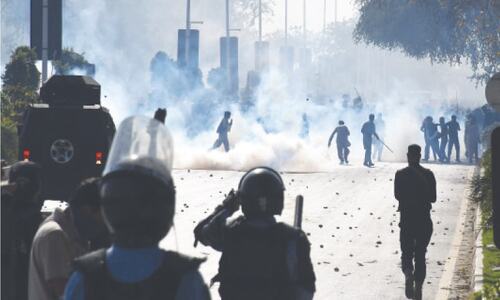TAXILA: The crumbling Mughal era monument in Hassanabdal, locally known as tomb of Princess Lalarukh, is in dire need of preservation and restoration.
The tomb’s past grandeur is fast fading with graffiti covering the walls and growing encroachment.
According to local traditions and some historians, a woman from the household of Mughal Emperor Humayun is buried here. Many believe her name was Lalarukh and she died at Hassanabdal while travelling to or from Kashmir. Others assert the princess was the daughter of Emperor Aurangzeb.
An oriental romance by Thomas Moore published in London 1817 by the name ‘Lalla-Rookh’ also features a princess by the same name but she is a fictional daughter of Emperor Aurangzeb.
In 1905, the tomb was first described in the revenue records as Maqbara Bibi Lalarukh (the Tomb of Lady Lalarukh). Later historians believed that British officers at the time, charmed by Thomas Moore’s imaginary heroine, may have given the unknown woman of the Mughal lineage buried here the name Lalarukh.
There is no reliable historical record of Aurangzeb having a daughter with this name.
According to official records, the tomb was declared a ‘protected site’ by the British government through the Punjab Government Gazette of October 26, 1917.
The tomb also holds architectural significance as a cenotaph built in variegated sand stone stands on a high platform in a large enclosure.
This enclosure is approached through a wooden door on the west, which is now in poor condition. A spring flows past the enclosure wall on the north.
Despite its historical significance, the site has been neglected for years. The walls of the tomb complex are in a dilapidated condition with no repair work taken up by the Federal Department of Archeology and Museums for over two decades.
The graffiti on the eastern and southern walls of the tomb speaks volumes about the apathy of both the public and the officials concerned.
These vandals outrightly reject the Section 19 (1) of the Antiquities Act 1975, which states “No person shall destroy, break, damage, alter, injure, deface or scribble, write or engrave any inscription or sign on any antiquity or take manure from any protected antiquity who ever contravenes the provisions of sub section (1) shall be punishable with vigorous imprisonment for a term which may extend to 3 years or fine or with both”.
Despite the law being unambiguous, no one has ever been booked under these rules for vandalising this site of national and cultural importance.
Moreover, commercial and domestic activities go on unabated.
According to Section 22 of the Antiquities Act 1975 the building of any structure within 200 feet of protected sites is prohibited.
The rule states: “Notwithstanding anything contained in any other law for the time being in force, no development plan or scheme, or new construction within, distance of two hundred feet of a protected immovable antiquity shall be undertaken without approval of the Director General”.
Published in Dawn, May 3rd, 2015
On a mobile phone? Get the Dawn Mobile App: Apple Store | Google Play































